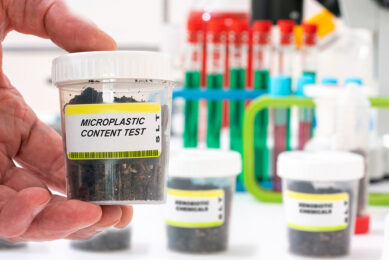Biotin for horses: does it really work?

Biotin is a popular nutritional supplement for horses to promote and maintain the growth of healthy hooves and coats. However, little up to date information is available whether supplementat ion of biot in has an actual effect. Feed Mix summarises some recent insights on this topic.
Biotin, originally called Vitamin H, (from Haut, the German word for skin) or B7 is a water soluble B-complex vitamin. It is necessary for cell growth, the production of fatty acids, and the metabolism of fats and amino acids. It plays a role in the Citric acid cycle, which is the process by which biochemical energy is generated during aerobic respiration.
Biotin not only assists in various metabolic reactions, but also helps to transfer carbon dioxide. Biotin is also helpful in maintaining a steady blood sugar level and for strengthening hair and nails in humans and hoof and skin conditions in horses. However, horses, humans and other mammals are incapable of synthesising biotin and it should therefore be obtained either through the diet or via the absorption of biotin that is synthesised by intestinal bacteria. High concentrations are found in alfalfa. Moderate concentrations are found in oat, barley, and soybean meal, and only in low levels in corn.
Research studies
Only a few studies have been performed to determine the effect of biotin for horses. A two-year trial in Austria, ending in 1991 looked at the effect of biotin in 26 stallions. 16 horses received a placebo. Hoof quality began to improve after nine months in the supplemented horses, when a lessening of the hoof cracks and less crumbling of the hoof horn was obvious. Black et al, 1985, examined the hooves of 85 horses, all supplemented with biotin for at least one year, and comparedthem to nine control horses with no supplementation.
Only a few studies have been performed to determine the effect of biotin for horses. A two-year trial in Austria, ending in 1991 looked at the effect of biotin in 26 stallions. 16 horses received a placebo. Hoof quality began to improve after nine months in the supplemented horses, when a lessening of the hoof cracks and less crumbling of the hoof horn was obvious. Black et al, 1985, examined the hooves of 85 horses, all supplemented with biotin for at least one year, and comparedthem to nine control horses with no supplementation.
They found that supplemented horses showed better appearance of new horn near the coronary band after 3- 6 months of supplementation, and had significant improvement at the weight bearing border 8-15 months after the start of biotin supplementation. The most recent trial has been carried out in 1998 when the effect of dietary biotin supplementation on growth and growth rate of the hooves of 8 match-paired ponies was investigated by Reilly et al.
The researchers observed that biotin supplementation produced a significantly higher growth rate of hoof horn, with treated horses showing a 15% increased growth rate of hoof horn, and 15% more hoof growth to controls after five months of supplementation with biotin. From these studies it is clear that horses might derive some benefit from biotin supplementation. However, current recommendations for biotin supplementation are often based on the positive results obtained in the clinical studies in horses and extrapolations from results reported in other species, such as humans, pigs, and cows, according to Carey Williams, PhD, equine specialist and assistant professor at the Equine Science Centre at Rutgers, the State University of New Jersey in the US. According to Williams, more is not always better. Some studies have shown that 60mg
is effective, but other studies say that 15-20mg already shows good results.
is effective, but other studies say that 15-20mg already shows good results.
Horse owners should look for a supplement that will deliver 20mg of biotin per day, advises Williams. In addition, biotin supplements are quite expensive, so overfeeding is financially not wise.
Quality issues
Choosing the right dose is one thing, but quality also seems to vary in biotin supplements, says Scott Weese, DVM, DVSc, Dipl. ACVIM, an associate professor in the University of Guelph’s Ontario Veterinary College in Canada. The lack of regulation permits the production of poor-quality supplements, including those that do not contain the amount of biotin that is listed on the label. A number of biotin supplements manufactured for human consumption have been evaluated by www.consumerlabs. com, a for-profit company dedicated to identifying quality health and nutritional products through laboratory testing.
Choosing the right dose is one thing, but quality also seems to vary in biotin supplements, says Scott Weese, DVM, DVSc, Dipl. ACVIM, an associate professor in the University of Guelph’s Ontario Veterinary College in Canada. The lack of regulation permits the production of poor-quality supplements, including those that do not contain the amount of biotin that is listed on the label. A number of biotin supplements manufactured for human consumption have been evaluated by www.consumerlabs. com, a for-profit company dedicated to identifying quality health and nutritional products through laboratory testing.
This company found several biotin supplements that did not contain the expected amount of biotin. While the company did not test any equine biotin products, there is no reason for owners to believe that biotin supplements produced for horses will be better-quality products than those produced for humans.
Responsibility of the owner
Despite its popularity, there is limited scientific “proof” that biotin actually impacts hoof growth, integrity, or any other quality pertaining to the hoof or skin. However, non-dietary factors such as trimming, shoeing, and mechanical factors, perhaps in combination with biotin supplementation may all contribute to improved hoof quality and rate of growth, according to Ray Geor, BVSc, PhD, equine specialist at Virginia Polytechnic Institute and State University “Evaluating the effect of a dietary supplement in horses is a challenging, time-consuming, and costly activity,” states Geor.
Despite its popularity, there is limited scientific “proof” that biotin actually impacts hoof growth, integrity, or any other quality pertaining to the hoof or skin. However, non-dietary factors such as trimming, shoeing, and mechanical factors, perhaps in combination with biotin supplementation may all contribute to improved hoof quality and rate of growth, according to Ray Geor, BVSc, PhD, equine specialist at Virginia Polytechnic Institute and State University “Evaluating the effect of a dietary supplement in horses is a challenging, time-consuming, and costly activity,” states Geor.
“Since a multitude of products are already available and widely used, product manufacturers are not likely to fund this type of study.” On a positive note, biotin is safe and there is some evidence that it can exert beneficial effects that have yet to be identified. In addition, biotin is readily available, it is stable, and it’s simple to administer orally with the horse’s feed. It is, therefore, the owner’s or trainer’s responsibility to decide whether there is enough evidence to confidently supplement with biotin. Horse owners should be awarre that the possible effects of biotin are not obvious in the first months of supplementation. Because biotin is incorporated into the hoof horn it must be given over a period of time (8-12 months) to allow normal hoof growth.
*Feed Mix would like to thank TheHorse.com for permitting us to use some of their information. Please visit TheHorse.com for more horse health information.











